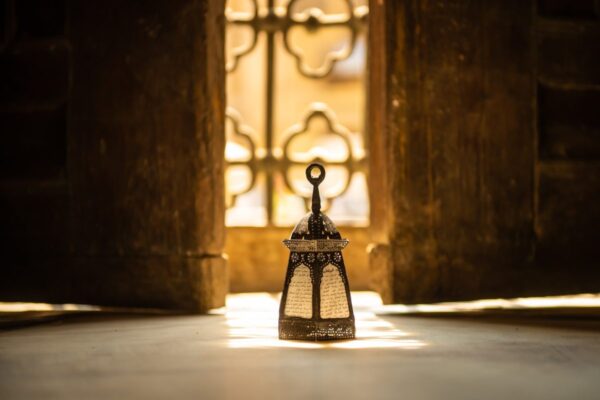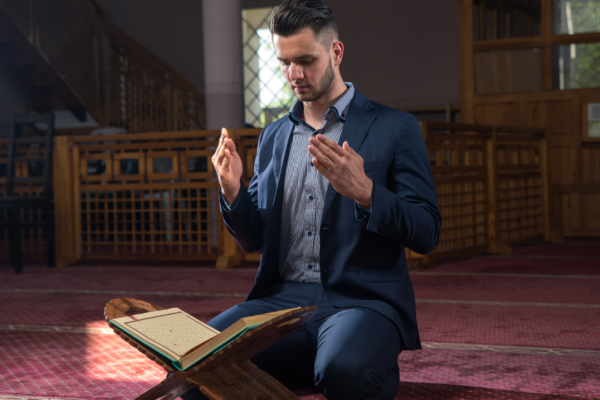Almost everyone dreams every night. Some of those dreams are quite confusing. Some dreams are simply the reflection or processing of everyday events. And other dreams are about things that have never been thought or dreamed about before. Wat is the Islamic view on this?
Contents
- 1 Three categories of dreams
- 2 Different visions
- 3 A glimpse from the unseen
- 4 Examples from the Quran & Sunnah
- 5 The dream of the Prophet Yusuf عليه السلام comes true
- 6 The dream about the prisoners
- 7 The dream of the king of Egypt
- 8 Dreams of the Prophet Muhammad ﷺ
- 9 The Conquest of Makkah
- 10 Dreams can be an indication of al ghayb
Three categories of dreams
The Prophet Muhammad ﷺ made it clear that we can classify our dreams into three categories based on their source:
1. Divine Dreams
2. Self related dreams
3. Devilish Dreams
Self-related dreams are the dreams about what someone is going through or has experienced in life, or the dreams about the things the person wants or doesn’t want.
Devilish dreams are the nightmares that come from the devil.
Divine dreams are those directly shown by Allah or His angels, and they have divine meanings.
We will mainly talk about the divine dreams. These dreams are also called truthful or reliable dreams.
Different visions
Before giving examples, we find it helpful to briefly mention one issue: Freudian psychoanalysis does not account for divine dreams. According to Freud, dreams are shaped by internal or external stimuli. According to him, our imagination would shape those stimuli. In our dreams there are traces of events that we experience in the past.
Freud thought that just as a child sees the things he wants but cannot get, so every human being would see in his dreams the desires he could not satisfy. Desires that have been put into the subconscious by religious beliefs or cultural pressures are said to show up in dreams. He saw dreams primarily as the symbolic fulfillment of our biological needs for sex.
From an Islamic point of view, it is certainly not an acceptable idea to see a trace of sexual inclination in every dream, or to think that dreams only occur due to internal or external stimuli. We can explain some dreams from the subconscious, but it is not right to explain every dream from there and generalize it.
A glimpse from the unseen
There are dreams which are not a reflection of the subconscious, but which are glimpses of al ghayb (the unseen, unknown) and which come into the “eye” of the heart.
Thus, the view of the school of psychoanalysis can only explain some dreams, not all. Almost every human being experiences divine dreams that contain messages and secrets, even if they are rare. There are dreams that come true the next day or years later. Such dreams occur when what is written in the Lawh Mahfuz (the Well-Kept Tablet where all the decrees of Allah are kept) is reflected on the mirror of the heart.
While our senses are at rest, our imagination is active when we sleep. Therefore, the things that are reflected from the Lawh Mahfuz to our hearts remain in our memory in the form of symbols and shapes that our imagination forms. When we wake up, we remember those symbols and forms when it comes to divine dreams.
How can you know if a dream is divine? One aspect of the reliable dreams is that they give comfort to the person and bring divine good news.
Examples from the Quran & Sunnah
The Prophet Muhammad ﷺ spoke of this kind of dream as mubashshirat (glad tidings) and said:
“Prophethood is over. No other prophet will come after me…” Then the Sahabah (companions) asked, “What are mubashshirat O Messenger of Allah?” The Prophet Muhammad ﷺ said: “The (reliable) dream that a Muslim sees. It is part of the parts of prophethood.” (Tirmidhi, Dream, 2)
The fact that the wahy (revelation) to the Prophet Muhammad began in the form of reliable dreams helps us to understand the above hadith (tradition). As Aisha رضي الله عنها reported, the dreams that Prophet Muhammad ﷺ saw at the beginning of the wahy were clear, as clear as the light of the morning. (Bukhari, Bad’u’l wahy, 3).
When she was close to death, Amina رضي الله عنها – the mother of our prophet – says to her son:
My son, if the things communicated to me in my dream are true, then you will be the person who will save humanity.
In the Holy Quran, especially in Surah (chapter) Yusuf, dreams are mentioned very often. In that surah, the first dream mentioned is a dream seen by Prophet Yusuf when he was a child. In his dream he sees eleven stars, the sun and the moon prostrating before him. He tells his dream to his father. Then his father says:
“And thus will your Lord choose you and teach you the interpretation of the sayings and complete His favor upon you and upon the children of Yaqub, as He completed it formerly upon your fathers, Ibrahim and Ishaq; surely your Lord is All-Knowing, All-Wise.” (Quran, 12:6).
The interpretation of what was taught to the Prophet Yusuf عليه السلام is in a sense explained as the interpretation of dreams. It is also explained as understanding the details of the divine message or feeling the consequences of the events that will take place.
The dream of the Prophet Yusuf عليه السلام comes true
Yusuf عليه السلام’s dream comes true after many years. The Prophet Yusuf عليه السلام becomes the Minister of Finance of Egypt after a long time. He called his parents and siblings to Egypt without them knowing who he was. They showed respect for his spiritual superiority and authority. Then the Prophet Yusuf reminded his father of the dream he saw years earlier:
“O my father, this is the meaning of my vision of old; my Lord has indeed made it true” (Qur’an, 12:100).
In the dream, the Prophet Yusuf saw his parents and brothers in the form of symbols. The Eleven stars represented his brothers, and the sun and moon where a representation of his parents. The bowing before him represents Yusuf’s spiritual and psychic superiority.
Prophet Yaqub resolved the language of the symbols in Prophet Yusuf’s dream. He gave meaning to the divine message in the dream.
The dream about the prisoners
The second dream narrated in Surah Yusuf is the dream of two people in prison. One of them sees himself pressing grapes, and the other sees birds eating bread from his head. They wanted the Prophet Yusuf عليه السلام , who was then in prison for a smear campaign, to interpret their dreams. The Prophet Yusuf عليه السلام first tells them about the truth of tawheed (the oneness of Allah). Then he informs them that the one who presses grapes will get his old job, and the other one will be executed. (Quran, 12:36-41).
The dream of the king of Egypt
The last dream in Surah Yusuf is the dream of the king of Egypt. The monarch sees in his dream that seven thin cows eat seven fat cows. He also sees seven green and seven dry ears of corn. He tells his dream to the people around him. They regard them as meaningless dreams because they cannot explain it.
The person that came out of prison tells the monarch after a while about the dream interpretations of the Prophet Yusuf عليه السلام. He is sent to prison to have the dream interpreted. The Prophet Yusuf عليه السلام tells him that seven years of scarcity and deprivation follow seven years of wealth and abundance (Qur’an, 12:43-49). That interpretation causes Prophet Yusuf to become released from prison and to become the Minister of Finance after it becomes clear that he had been innocent. The dream came true as he described.
From the dream of the monarch it can be concluded that people who think about the future of their country receive messages about this in their dream
Dreams of the Prophet Muhammad ﷺ
There are also some dreams of the Prophet Muhammad ﷺ in the Quran. One of them is the dream that Prophet Muhammad ﷺ saw before the Battle of Badr. He saw in his dream that the enemy was few in number and passes on the good news to his companions. The verse reads as follows:
“When Allah showed them to you in your dream as few, and if He had shown them to you as many, you would surely have grown weak and would have quarreled over the matter, but Allah saved (you); surely He is the Knower of what is in the breasts.” (Quran, 8:43).
Even though the enemy is great in number, it was shown as small to the Prophet Muhammad ﷺ in his dream. This gave the believers courage to take part in the war. From the enemy’s point of view, that same dream would make it clear to them that they were spiritually weak and unsupported, for though they were great in number; they did not have high values and lofty goals. When we think about it, we see that their real situation was shown to the Prophet Muhammad ﷺ.
The Conquest of Makkah
Another dream of the Prophet Muhammad ﷺ mentioned in the Qur’an is about the entry of the Muslims into Makkah. He dreamed that the Muslims entered Makkah and made tawaf (circumade of the Kaaba) in the year of the treaty of Hudaybiya, and he told his companions about it. That is why his companions – who thought the entry would take place in that year – returned disappointed. But then came the Surah of Victory which eased their sorrow. The portion of the Surah pertaining to the dream goes as follows:
Verily, Allah has fulfilled the vision for His Messenger. Thou shalt enter the Holy Mosque, Allah willing, with peace of mind, head shaven, or hair cut short, and fearless. For He knew what you did not know, and He also gave you speedy victory. (Quran, 48:27).
That dream came true in the form of the umrah (the minor pilgrimage to Makkah that can be undertaken by Muslims at any time of the year) that took place after one year, and in the form of the conquest of Makkah after two years.
Dreams can be an indication of al ghayb
These dreams exemplified in the Qur’an belong to the good news, the holy consolation of al ghayb (the unseen, unknown). The dreams of two men in prison and the dream of the prince of Egypt show that people other than the prophets can also have dreams containing messages related to al ghayb.
When Sayyid Qutb, one of the contemporary interpreters (mufassirs), was in the United States of America, he dreamed that his cousin had blood in his eye. When he inquired about his cousin’s condition through a letter, he learned that his cousin had internal bleeding and was under medical treatment. The bleeding that could not be seen with the naked eye was shown in his dream to his uncle who was continents away. (Qutb, IV, 197)
In history there are many dreams that have become famous. One of them is as follows:
The President of the United States Abraham Lincoln sees in his dream that he is killed while watching a performance in the theater. He tells his dream to his friends. The next day, when he is at the theater, someone enters the theater during a tense scene of the performance and kills him with his gun. (Apr 14, 1865)






